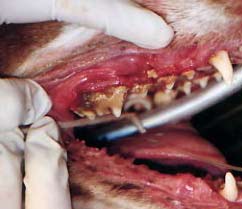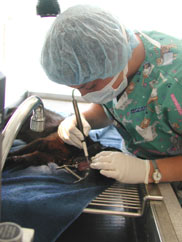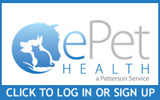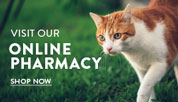Frequently Asked Questions
Have a question regarding your pet and it's care?
Contact usand we will be glad to answer. If it is a really good question, you might find it posted here.
There are several shots puppies and kittens require. Puppies need vaccinations for DHLP-P ("Distemper"), Corona, Rabies, Bordetella (Kennel Cough), and Lymes. Kittens need vaccinations for FVRCP-C ("Distemper"), FeLV (feline leukemia) and Rabies. As with children, several booster shots must be given so that the puppy or kitten can build up antibodies to the infections vaccinated for.
Puppies:
- 6 weeks: DHLP-P 1
- 9 weeks: DHLP-P 2, Corona 1
- 12 weeks: DHLP-P 3, Corona 2, Bordetella
- 16 weeks: DHLP-P adult, Rabies, Lymes
Kittens:
- 6 weeks: FVRCP-C 1
- 9 weeks: FVRCP-C 2
- 12 weeks: FVRCP-C 3, FeLV 1
- 16 weeks: Rabies, FVRCP-C adult, FeLV 2
To best house train your puppy, it is recommended that you purchase a small carrier or kennel that gives the puppy enough room to turn around. This carrier will become the puppies bedroom.
While at work, away from home or unable to watch the puppy, place him in his room. When able to watch the puppy, take the puppy outside after each meal and about every two hours.
When the puppy is good, praise him. As the puppy grows, he will be able to tell when he has to go outside, but until then, you must anticipate his needs.
In a spay, the ovaries and most of the uterus are removed. It is essentially an ovariohysterectomy. It is recommended to have the surgery done before the animal has its first heat (approximately 6 months of age).
When your pet comes in for surgery, she will have a blood test that screens liver function, kidney function, the electrolytes and a complete blood count. We use anesthetic that is up to human standards and patients are kept overnight for monitoring.
In a neuter, the testicles are removed and the seminal vesicles tied off. It is recommended to have the surgery done at approximately 6 months of age. Each surgery patient has a blood test that screens liver function, kidney function, the electrolytes and a complete blood count. We use anesthetic that is up to human standards and patients are kept overnight for monitoring.
 Unlike humans, animals do not brush their teeth. Dry pet foods help to some
degree. When the animal chews on the hard food, this action displaces the tartar building up on the
teeth. Some animals are more prone to dental problems. Tartar build up can lead to infections
because it gives the bacteria a warm, moist environment. This bacteria can then be swallowed and may
enter the bloodstream causing heart, liver and kidney diseases. The dog in the picture suffers from
tartar buildup and gingivitis (inflammation of the gums).
Unlike humans, animals do not brush their teeth. Dry pet foods help to some
degree. When the animal chews on the hard food, this action displaces the tartar building up on the
teeth. Some animals are more prone to dental problems. Tartar build up can lead to infections
because it gives the bacteria a warm, moist environment. This bacteria can then be swallowed and may
enter the bloodstream causing heart, liver and kidney diseases. The dog in the picture suffers from
tartar buildup and gingivitis (inflammation of the gums).
 Prior to the procedure, patients have a blood test that tests liver and kidney
function as well looks for signs of infection. A mild anesthetic is used and most patients go home
the same day. Tartar and plaque are removed with an ultrasonic scaler above and below the gumline.
This is followed by polishing which smooths the tooth enamel slowing any future plaque buildup.
Therapy is continued at home with a round of antibiotics to ward off any bacteria loosened up by the
cleaning. It is recommended to brush you pets teeth with a toothpaste and toothbrush designed for
dogs and cats to prevent further buildup and to help strengthen the gums. Pet toothbrushes are
ultra-soft and shaped to fit the mouth and teeth of your pet. Human toothpaste is not recommended
because it contains ingredients that are not meant to be swallowed. Also, pet toothpastes come in
flavors that appeal to dogs and cats, such as salmon, malt and poultry flavors.
Prior to the procedure, patients have a blood test that tests liver and kidney
function as well looks for signs of infection. A mild anesthetic is used and most patients go home
the same day. Tartar and plaque are removed with an ultrasonic scaler above and below the gumline.
This is followed by polishing which smooths the tooth enamel slowing any future plaque buildup.
Therapy is continued at home with a round of antibiotics to ward off any bacteria loosened up by the
cleaning. It is recommended to brush you pets teeth with a toothpaste and toothbrush designed for
dogs and cats to prevent further buildup and to help strengthen the gums. Pet toothbrushes are
ultra-soft and shaped to fit the mouth and teeth of your pet. Human toothpaste is not recommended
because it contains ingredients that are not meant to be swallowed. Also, pet toothpastes come in
flavors that appeal to dogs and cats, such as salmon, malt and poultry flavors.
You should have the name of the medication ready and call your doctor or
Poison Control
However, most medications for animals are low dosages and thus not harmful to humans.
You should have the name of the medication ready and call your veterinarian or
Poison Control
Some medications and household items are toxic to animals and could kill them if not treated right away. For instance, aspirin, tylenol and lilies are toxic to cats and antifreeze is toxic to most animals.




